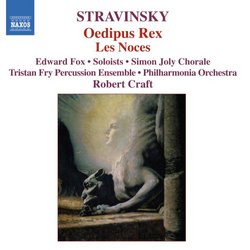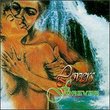| All Artists: Igor Stravinsky, Robert Craft, Philharmonia Orchestra of London, Edward Fox, David Wilson-Johnson, Susan Bickley, Alison Wells, Jennifer Lane, Martyn Hill, Joseph Cornwell Title: Stravinsky - Oedipus Rex · Les Noces Members Wishing: 1 Total Copies: 0 Label: Naxos Release Date: 1/18/2005 Genre: Classical Styles: Opera & Classical Vocal, Ballets & Dances, Ballets, Historical Periods, Modern, 20th, & 21st Century Number of Discs: 1 SwapaCD Credits: 1 UPC: 747313249923 |
Search - Igor Stravinsky, Robert Craft, Philharmonia Orchestra of London :: Stravinsky - Oedipus Rex · Les Noces
 | Igor Stravinsky, Robert Craft, Philharmonia Orchestra of London Stravinsky - Oedipus Rex · Les Noces Genre: Classical
|
Larger Image |
CD DetailsSimilar CDs
|
CD ReviewsOedipus: 3 stars; Les Noces: 5 stars J Scott Morrison | Middlebury VT, USA | 02/20/2005 (4 out of 5 stars) "These two performances led by Stravinsky's protégé, Robert Craft, were previously released in, I believe, 2001 on Koch International, but with different couplings. I'm not entirely sure why they are now re-appearing so soon on Naxos, but it is nice that the reissue is at a bargain price. For my money, the two performances are wildly dissimilar and thus my title line. 'Oedipus Rex' is given a non-competitive performance; 'Les Noces' is among the best I've ever heard. 'Oedipus Rex' is clearly one of Stravinsky's masterpieces. Scorned and shunned for a couple of decades after its premiere in Paris in 1927, it has since been recognized as one of Stravinsky's finest works and it has had a profound influence on the writing of many subsequent composers, primarily those in the French ambit (Honegger, Martinu, Milhaud). The notion that an oratorio sung in Latin would create a greater sense of occasion and grandeur was Stravinsky's. He prevailed on Jean Cocteau to write the libretto in French and then he had it translated into archaic Church Latin by a Catholic cardinal, Jean Danielou. Stravinsky collaborated with Cocteau on the libretto and insisted he rewrite it twice, each time tightening and eliminating verbiage. As he said, 'I am a topiarist at heart, and my love for clipping things sometimes amounts to a mania.' As well, the narration is cut to the bare minimum on the assumption that people already knew the basic outline of the Oedipus tragedy and didn't need too much exposition. Stravinsky insisted that in any performance the narration should be spoken in the language of the audience. He asked E. E. Cummings to write an English translation of Cocteau's narration, but he and Robert Craft, then practically a member of Stravinsky's household, didn't like it and they wrote their own. A comparison of the two versions of the narration shows clearly that Cummings's is superior. In this performance, conducted by Craft, not surprisingly we get his and Stravinsky's version, to our disadvantage. Anyone who has ever read much of Craft's writing will know that he is not an elegant writer. This performance is not helped by the rather schoolmasterly narration by the British actor, Edward Fox. What of the musical performance of 'Oedipus'? Well, one must remember that this work has had numerous recordings, including two led by Stravinsky himself (one of them with the French narration). Bernstein, Salonen, Abbado, Levine and others have recorded it. The young Colin Davis led an incandescent performance in the 1960s on EMI (with Sir Ralph Richardson electrifying us with the narration). I only once heard the French version led by Stravinsky, many years ago, but it remains an indelible memory. The subsequent recording for CBS/Sony/Columbia (whatever it's called these days) was later and it remains my favorite of reasonably easily available versions. Consider the soloists: George Shirley as Oedipus, Shirley Verrett as a towering Jocasta, Donald Gramm as Creon, John Reardon as the Messenger. And the leaden narration is nonetheless read with considerable drama by John Westbrook. In the present recording none of the soloists measures up to that cast. The best of the lot is Jennifer Lane as Jocasta (and her Wood Dove in Craft's recently released 'Gurre-Lieder' is outstanding). Martyn Hill is adequate as Oedipus, but only just. David Wilson-Johnson is miscast as Creon; he has neither the lower vocal range nor the rhythmic sense of the great Donald Gramm; he also sings the Messenger, more or less adequately. The real high point for this recording is the presence of the Simon Joly Male Chorus; they sing well, with drama and heft. Their pronunciation of the Latin is a bit puzzling (as, come to think of it, is true of the soloists; I wonder if that is Craft's doing?). I think they are mimicking what is thought to be 'classical' Latin pronunciation, rather than the Italianized Latin used by most singers these days. But it is jarring to hear such things as 'Oydipus' and 'c' always pronounced as a 'k.' Craft, in his booklet notes, quotes the famous Norton Lecture assertion by Leonard Bernstein that Stravinsky was influenced in his writing of 'Oedipus' by Verdi's 'Aïda.' It really makes sense; this is surely one of the most nearly operatic of Stravinsky's mid-period works; in spite of it generally being performed unstaged, its official designation is 'opera-oratorio.' Unfortunately, Craft seems to ignore this insight and conducts it as if it were a religious rite, not a dramatic story. Stravinsky does not make that mistake in his own recordings. But now we come to a joyous and exhilarating performance of 'Les Noces.' This is a score rarely heard in concert because of its unusual instrumentation (four pianos, seventeen percussion instruments). Special performances are also rare because it is not long enough to take up an entire evening and there are very few works by other composers that partake of similar instrumentation. I was once fortunate to see a performance that featured native Russian dancers and actors (the Pokrovsky Ensemble) who portrayed the action of the peasant wedding. It remains a vivid memory. As Andrew Clements has stated, in this work 'Russian musical inheritance is presented without any civilizing filters.' Nothing like Western art music development or form intrudes. This is raw, powerful, evocative music. Some people find it crude and intolerable. I find it exhilarating. There have been few recordings of 'Les Noces,' although there was one many years ago that featured as pianists the eminent American composers Aaron Copland, Samuel Barber, Lukas Foss and Roger Sessions. Unfortunately, the singers and percussionists were not first-rate. No such problem here. All participants are fully up to the task. As I follow the score I note that the tricky rhythms are managed extremely well, better even than the composers mentioned above! The pianists here are Elizabeth Bergmann, Marcel Bergmann, Jeroen van Veen and Maarten van Veen who make up the International Piano Quartet. The percussionists are the 'Tristan Fry Percussion Ensemble,' a group of six players that I gather is an ad hoc group; whatever they are, they're terrific. The Simon Joly Chorale manage the complex rhythms and fast-moving Russian text fluidly (although I must admit my Russian doesn't allow for much more than simply following the words in the score as they fly by). The excellent vocal soloists are Alison Wells, soprano; Susan Bickley, mezzo; Martyn Hill, tenor; and the cavernous-voiced basso Alan Ewing. What to do? At this price, I would recommend the CD for 'Les Noces.' I cannot recommend 'Oedipus' when there are better versions out there--although some of the ones I mention might require some searching. TT=76:29 Scott Morrison" Stravinsky, Les Noces (Svadebka) Eccentric S&P 500 CEO | New York, NY, USA | 04/23/2005 (5 out of 5 stars) "Haven't heard the Naxos record, but the Craft Koch Les Noces (Svadebka) (out of print and now licensed from Koch to Naxos) is a GREAT performance of one of Stravinsky's most profound and Russian works. Don't miss it unless you can get the Koch disk, which also includes a great performance of Stravinsky's Threni (and an uncompetitive Symphony of Psalms)." Two masterpieces at a bargain price, but . . . Santa Fe Listener | Santa Fe, NM USA | 05/21/2006 (3 out of 5 stars) "For casual buyers the waters have gotten muddied over Robert Craft's still incomplete Stravinsky cycle, which began on MusicMasters in 1991, switched over to Koch International when the first label folded, and has now transferred to Naxos, who picked up the Koch recordings (all remakes of the MusicMasters titles, I believe). Craft has been recording a Schoenberg orchestral cycle with his new lable, but whether more Stravinsky installments are planned I don't know.
In any event, this Oedipus and Les Noces are both London remakes dating from 2001, and in the decade since Craft first recorded them on MusicMasters, he had lost quite a bit of energy and incisiveness. The earlier Oedipus also had better solo singers; here, Martyn Hill and Jennifer Lane sound wobbly, insecure, and a bit old for their parts. It's unfortunate that the superior Craft performance is only available on an out-of-print 2-CD set (Vol. 1 in the MusicMasters series, coupled with the Rite of Spring and a handful of shorter works--it's well worth seeking out on the used market). As for Les Noces, the situation is a bit reversed; the solo singers are better on this remake (though not dramatically) than their NY counterparts. I don't find Craft a superior Stravinsky conductor, despite his lifelong association with the composer, but he takes an agrreably lyrical and less barbaric approach to Les Noces than one often encounters. In sum, you can get better recordings of both these masterpieces, yet not at this bargain price." |

 Track Listings (10) - Disc #1
Track Listings (10) - Disc #1







